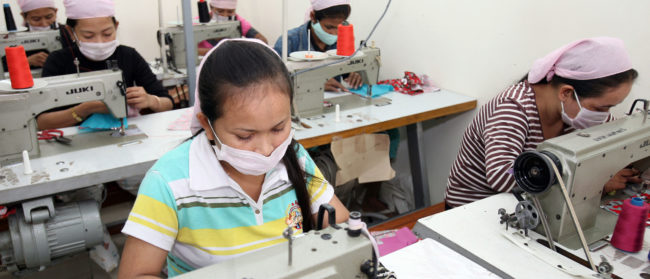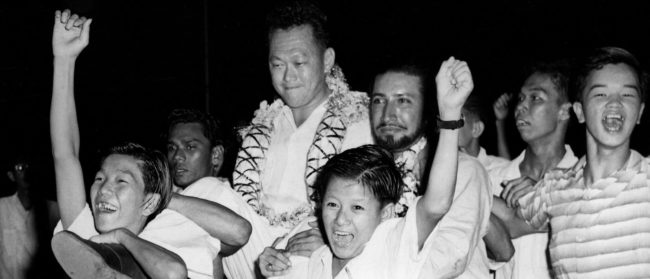For most of us, Facebook is a platform to share stories and ideas with friends and family, that hopefully ends with comments, likes and maybe some shares. For a 14-year-old girl in Kampot’s Kampong Trach district, on March 12, her social media post ended in her arrest.
Sharing her concerns over COVID-19 on Facebook, the girl was worried three classmates had contracted the novel coronavirus and had heard of multiple virus-related deaths in her local province.
According to Human Rights Watch (HRW) deputy Asia director Phil Robertson, authorities went to her home and arrested her for the social media post. “[It] is completely outrageous and unacceptable,” Robertson told the Globe. “The police who barged into her house and arrested her in front of her family should be eternally ashamed of themselves.”
She was then forced to make a public apology about spreading what the government deemed as “fake news” before being released. “The 14-year-old girl was simply concerned and trying to warn her classmates,” Robertson said, calling the Cambodian Prime Minister Hun Sen and his ministers “heartless” for allowing policies that could result in a schoolgirl being arrested for her online posts.
Like the virus, the girl’s story is not isolated. Since late January, the Cambodian government has arrested 17 people, accused of spreading dissenting views concerning the COVID-19 pandemic which has currently spread to 176 countries and infected over 530,000 worldwide. As of writing, Cambodia has recorded 98 confirmed cases of COVID-19.
Robertson believes Hun Sen’s government only wants their version of events to be seen by the Cambodian public and are cracking down on voices that are critical of the Kingdom’s response to the crisis.
“There is no doubt these arrests are clear violations of human rights that cannot be justified by the current situation,” Robertson explained.
“Most of these arrests can be classified as ‘kill the chicken and show it to the monkeys’ tactics, or in other words, making an example of one person posting information in order to scare off the others who might consider doing the same. This is why we’re seeing a pattern of arrest, lecture, apologise and release for most cases,” Robertson added.
Naly Pilorge, the director of Cambodian human rights organisation of LICADHO, told the Globe that they are also concerned over the Cambodian government’s monitoring of personal conversations.
“No persons should be sent to prison for sharing their opinion on social media during such confusing times – especially for private messages they’ve shared with their friends,” Pilorge stated.
“We understand the need for people to make sure they’re sharing accurate information about COVID-19, but this should never come at the cost of people’s fundamental rights,” Pilorge added.
According to HRW, of the 17 arrested, four are associated with now-defunct opposition group the Cambodia National Rescue Party (CNRP), dissolved in November 2017 by the Supreme Court. It’s former leader, Kem Sokha, is currently standing trial on charges of treason.
Robertson maintains the COVID-19 crisis is serving a wider political agenda of Hun Sen to persecute political opponents “and continue the ongoing dismantling of the CNRP networks in the country”.
According to HRW, among five Cambodians held in pre-trial detention, four are CNRP local officials with vague charges such as ‘conspiracy to commit a felony’. Their indefinite detention has also raised health concerns over the potential spread of COVID-19 inside prisons.
“Sending people to Cambodia’s hugely overcrowded prisons is like sentencing them to contract COVID-19, but the government apparently doesn’t care, at least when it comes to its political opponents,” Robertson said.
On March 18, 47 Facebook users and pages were accused by the Ministry of Information of spreading misinformation about COVID-19 and received warnings. Later that week on March 23, the Minister of Interior Sar Kheng gave a stern warning those spreading “misinformation” around coronavirus who aim to “stir chaos” would face litigation.
Compounding many people’s confusion surrounding coronavirus is Hun Sen’s rapidly-changing attitude toward the virus and transmission information within the Kingdom.
Hun Sen initially downplayed the virus, personally welcoming the Westerdam cruise ship into Sihanoukville – a port city with strong economic ties to China – on 20 February, after it was turned away from four countries for fear of it containing passengers carrying the virus.
Hun Sen also blasted reporters and officials at a news conference for wearing face masks, implying they were overreacting to the fear surrounding the virus. “The prime minister does not wear a mask, so why should you be wearing a mask here,” he said at the time.
By March 17, Hun Sen had changed tack, with the Cambodian government closing all educational institutions and imposing a 30-day travel ban on entry from five, mainly European, countries with high virus rates. Countries with similarly high rates – notably China, Iran, Japan and South Korea – were not subject to similar restrictions.
However, Robertson believes either way it’s too little, too late.
“The government has been very slow to provide either factually accurate information about COVID-19 or transparent accounts of what the government is actually doing to meet this threat,” Robertson said.
“The government is hardly testing anyone for COVID-19 which explains why numbers of positive cases are so low despite Hun Sen allowing flights into Cambodia from Wuhan and other parts of China long after other countries had discontinued them.”
Fearful for Cambodia’s healthcare system, HRW says preventing transmission is vitally important to stop a potentially massive influx of patients to the Kingdom’s hospitals.
“The government needs to get better information to people, and seriously promote policies to implement social distancing to try and flatten the curve before it’s too late,” Robertson gravely concluded.


